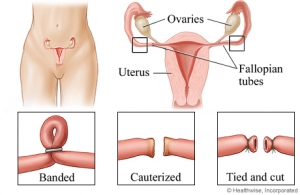 An Overview of Tubal Ligation Surgery as a Form of Female Sterilization
An Overview of Tubal Ligation Surgery as a Form of Female Sterilization
Women’s Specialists of Plano, a group of OBGYNs servicing the Plano, Frisco and Dallas, Texas area, offers tubal ligation surgery as a form of female sterilization.
Whether or not to have a baby is a choice that most women are free to make. There are times in a woman’s life when she will desire to be sexually active, but not become pregnant. When a woman is not ready to have children, or if she is unsure whether or not she would like to have children in the future, a temporary (reversible) contraception method is recommended. These types of contraception methods include birth control pills, intrauterine contraception devices (such as an IUD), a diaphragm, contraceptive foam, gels, condoms, etc.
When a woman is sure that she does not want to have children in the future a surgical procedure is usually recommended. In a traditional family, a discussion of a vasectomy or a tubal ligation ensues. These recommended procedures are considered “permanent birth control”.
Tubal ligation surgery is a procedure in which a woman’s fallopian tubes are cut, tied, or blocked to prevent future fertilization and implantation during sexual intercourse. According to the Women’s Specialists of Plano, there are many approaches to this surgery, which is considered female sterilization, and only your doctor will know which procedure is most suitable for your body and lifestyle. A few of the tubal ligation approaches are:
- Laparoscopic Tubal Ligation: During this procedure your gynecologist will insert a small camera and surgical instruments through a very small incision made in the abdomen. The tubal ligation will take place via this method which is considered a more minimally invasive approach.
- Mini-Laparotomy: During this procedure your gynecologist will perform the surgery by making an incision in the abdomen about 2 inches in length.
- Post-Partum Tubal Ligation: This procedure is very similar to the mini-lap, except that the incision will be made just below the belly button because the fallopian tubes are higher in body after childbirth.
- Open Tubal Ligation: This procedure is performed when a woman desires a tubal after delivering via caesarean section, because the abdomen is already open. This procedure is also performed when a woman has pelvic inflammatory disease, or is already receiving a surgery which requires the opening of the abdomen.
- Trans-Uterine Tubal Occlusion: This procedure is performed with anesthesia. The cervix is dilated and a hysterscope is placed in the uterine cavity. The opening of the tube into the uterus is identified and a “plug” is placed into the fallopian tube as it passes through the uterine wall.
A lot of women choose to receive a post-partum tubal ligation while they are pregnant with their last child. This procedure is popular because it eliminates the issue of having two recoveries periods. Most women have recovered from their tubal ligation long before they recover from childbirth. This procedure is especially productive when a woman receives a C-Section, though a vaginal birth does not make the procedure impossible.
If you change your mind after receiving a tubal ligation surgery and decide that you may want to have children in the future, there is a reversal procedure. But the reversal procedure is not 100% effective; hence the reason a tubal ligation is considered permanent birth control for women.
The recovery period after most tubal ligations is about a week though you will most likely leave the hospital within a few hours after surgery. Because the procedure is immediately effective, you can maintain sexual activity as soon as you feel well enough. You will be permitted to shower (not bathe) 24 hours after the surgery, though scrubbing of the incision is not permitted.
As with every surgical procedure, a tubal ligation surgery has both pros and cons:
Pros:
- Female sterilization that is effective immediately
- It can be done at the same time as other surgeries like C-section or the removal of ovarian cysts
- It is a very reliable form of permanent birth control
- Requires no daily attention
- More cost effective in the long run then a daily procedure
- Allows for sexual spontaneity
Cons:
- It is a surgery
- Every surgery has associated risks
- Is not 100% reversible in the event of regret
- Does not protect against STD’s (only the proper use of condoms can do this)
- Is more expensive than the male form of permanent contraception (vasectomy)
If you are researching permanent birth control for women, it is suggested that you do proper research and reflection to be sure that you will not regret the decision in the future. If you are sure about your decision to receive permanent birth control (female sterilization), join your doctor so that the two of you can discuss which procedure will be most fitting to your life.
To learn more about tubal ligation surgery, or to discuss other forms of female sterilization, contact the physicians at Women’s Specialists of Plano located in the Plano, Frisco and Dallas, Texas area.
